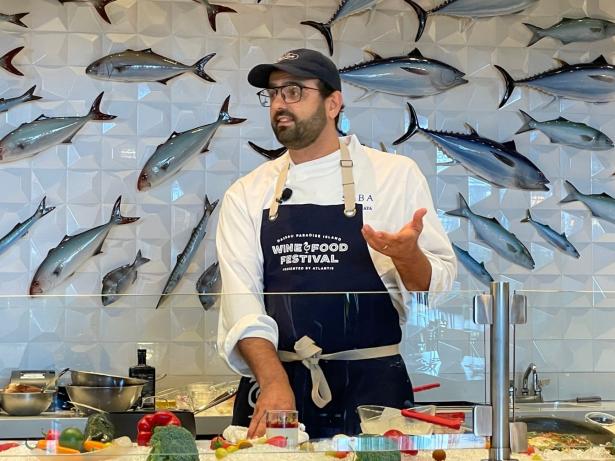This past weekend, Alon Shaya flew to Paradise Island, Bahamas to participate in the inaugural Nassau Paradise Island Wine & Food Festival. The five-day event included brunches, tastings, culinary demos, and other activities. Shaya, an Israeli-born chef, is best known for his New Orleans restaurants Saba and Miss River, and Safta in Denver. Shaya will also open a restaurant at the Atlantis Resort in Paradise Island this summer.
At a lunch demo held at chef Jose Andres’ restaurant, Fish, at the resort, Shaya prepared shakshuka, Bulgarian lamb kebabs with a cabbage salad, and malabi (a custard with strawberries, pistachios, and rose). While cooking, Shaya entertained guests with stories of wife Emily’s prowess with red beans (she is the recipient of the city’s “Bean Madness” award), and coming home as a child to a house filled with the scents of vegetables blistering on the stove.
Then the talk turned serious as Shaya recalled a 2011 trip to Yad Vashem, the Holocaust Museum in Israel. Amidst all the artifacts, books, and pictures of one of history’s darkest moments, Shaya's thoughts turned to how food and family might be the last comfort when everything else is lost. Other than knowing you will die, what is it that keeps you going? How do people balance this and understand that everything is about to end with something that brings you peace? It got me really interested in the power of food when everything else is going to destroy you.”
Four years later, at the U.S. Holocaust Memorial Museum in Washington D.C., Shaya came across a cookbook. “We were looking through the culinary artifacts and we came across this cookbook called the Fenves Family Cookbook. Steven Vendez, who donated the book to the museum, was 13 years old when he and his family were sent to Auschwitz. As they were kicked out of their house, all of the neighbors were standing and staring and cursing at them — waiting to ransack the apartment.“
What the family didn’t know, was that the family cook, Marish, was in the crowd. Powerless to stop the family from being taken, she rescued the family cookbook and some of Steven’s mother’s artwork.
At Auschwitz, the Fenvez matriarch was killed immediately, and the eldest Fenves also died. Steven Fenves and his sister survived. They returned to Yugoslavia, and Marish was there with the cookbook. The brother and sister left the items in Marish’s care until they were settled. Years later, a package arrived in Chicago where they had relocated. Years later, the family donated the book to the museum.
Shaya learned that Steven Fenves was still alive. He reached out to him and formed a friendship. Shaya wanted to cook the recipes, and Steven agreed to translate them from Hungarian. Shaya would cook the meals and send them to the family. It was the first time in over half a century that Steven had tasted his mother’s recipes.
Shaya and Fenves are now raising money to translate and digitize the letters, recipes, books, writings, and books that are stored in the U.S. Holocaust Memorial Museum. “There are $20 million pieces of artifacts in Polish, German, Russian, and Yiddish. They’re preserved in filing cabinets, but they’re not available to view,” says Shaya. With a one million dollar goal, Shaya and Fenves are hosting fundraising dinners to fund the project.
Shaya says there’s a much larger reason to fund this project.”The goal is to stop hate. You bake a cake from this book and you serve this cake and you say, let me tell you the story of this family and taste this cake and maybe it will connect that people shouldn’t hate each other.”
Shaya says that sharing a meal is a powerful tool against the rising hate against Jewish people and everyone else. “Through cooking, you can share these stories with the goal of stopping prejudice and ending hate. If you change one person in the world, you’ve made a difference.”
For Shaya, the Fenves Family Cookbook was his catalyst to stop hate through the shared experience of food. I asked the chef if the recipes could be turned into a book for all to share. “Maybe,” he replied.


Spread the word